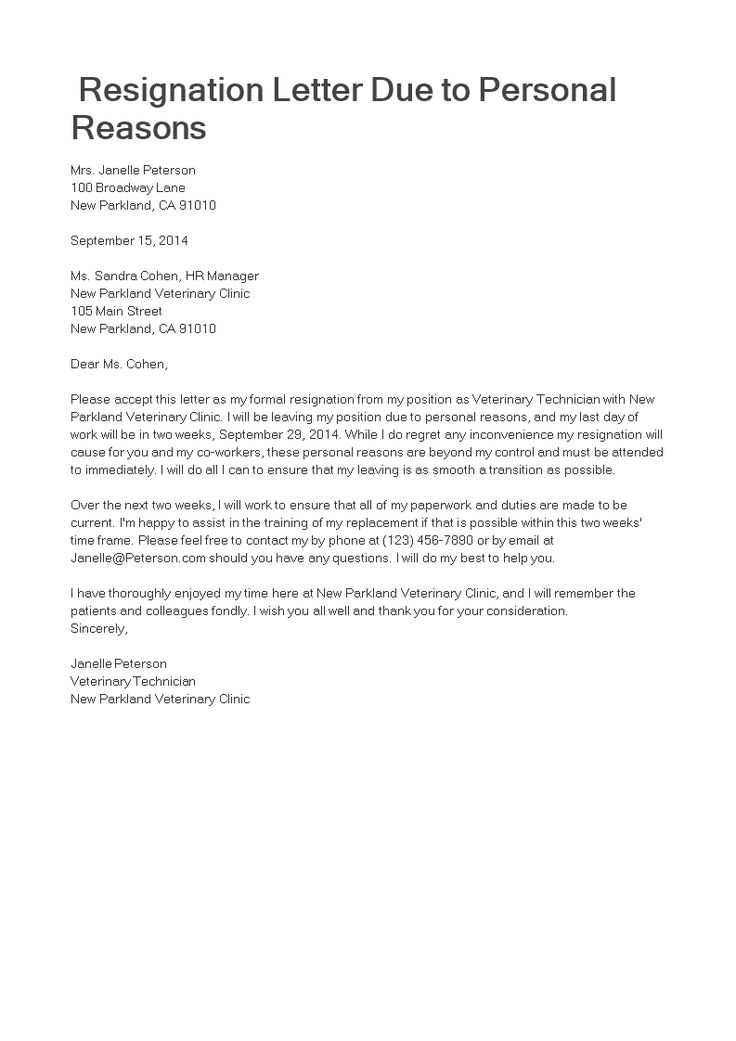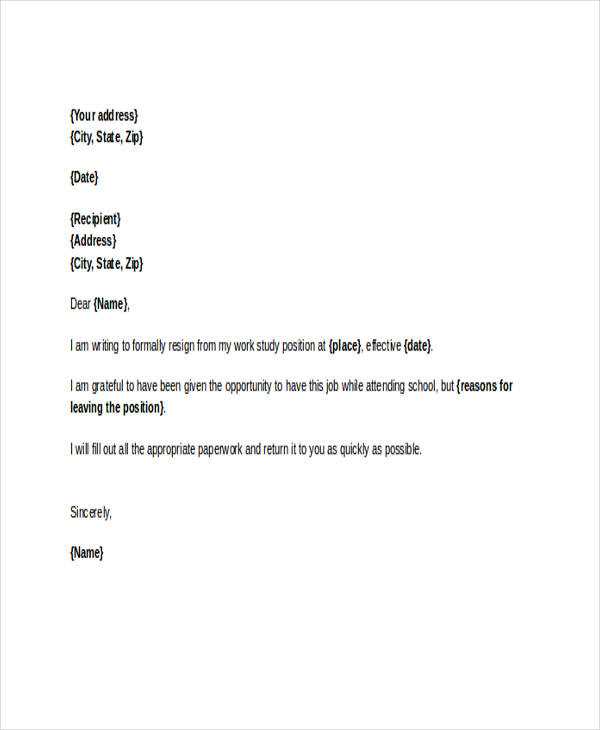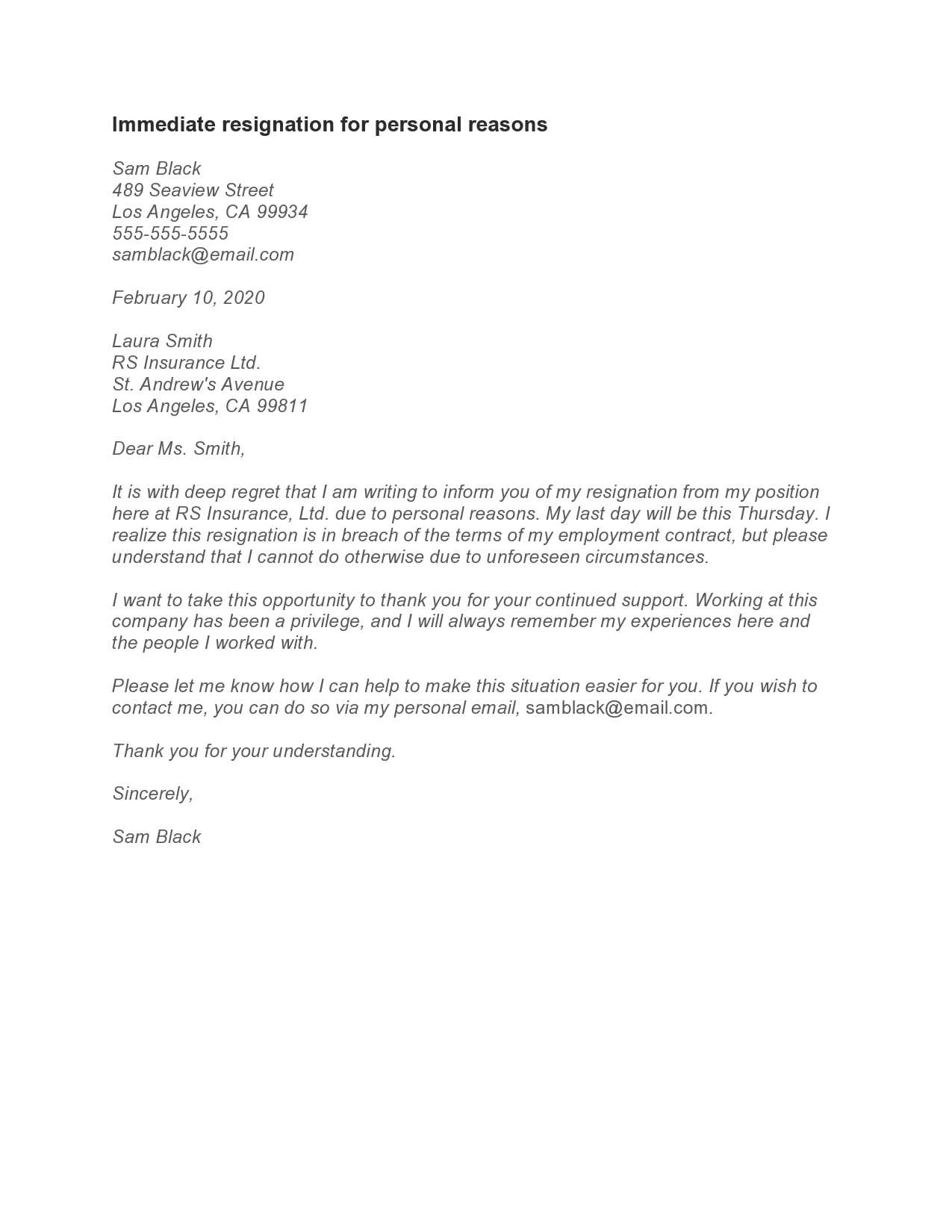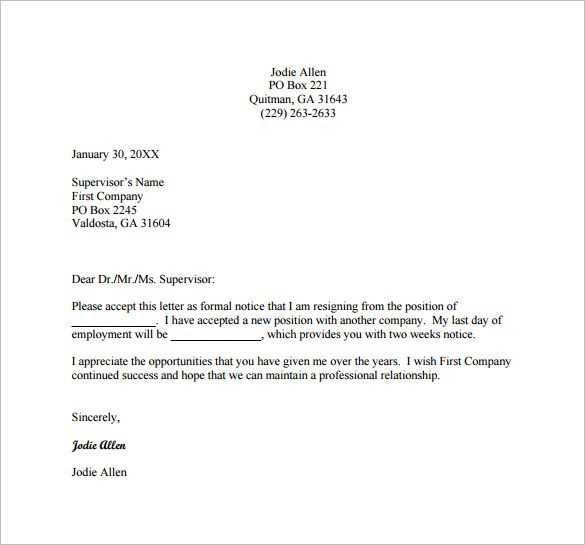Resignation Letter Template Due to Personal Reasons

When it comes time to step away from your current job, crafting a thoughtful and respectful message is crucial. Whether you’re leaving for family obligations, health concerns, or another private matter, how you communicate your departure can impact your relationship with your employer. A well-constructed farewell note ensures you leave on good terms, maintaining professionalism and respect.
Essential Elements of Your Departure Notice
A well-crafted message should contain a few key components to ensure clarity and professionalism. These elements help communicate your intent to leave while expressing gratitude for the opportunity. Include the following:
- Statement of Departure: Clearly express your intent to leave without ambiguity.
- Gratitude: Acknowledge the experiences, skills, and opportunities you’ve gained during your time at the organization.
- Offer to Assist with Transition: Show willingness to help ease the transition for your team or successor.
- Future Well-Wishes: End on a positive note, expressing hope for continued success for both yourself and the company.
Crafting a Clear and Respectful Message

While expressing your decision, maintain a respectful tone. It’s not necessary to go into deep detail about your reasons for leaving, especially if they are personal. The focus should remain on your appreciation for the opportunity and your commitment to a smooth handover.
Keeping the Tone Professional

Even when leaving for personal matters, the way you convey your message should be polite and formal. The tone of your note should reflect the professionalism you maintained during your employment. This will leave a lasting impression, whether you’re sending it via email or as a formal document.
Avoiding Common Pitfalls

There are several mistakes to avoid when composing your goodbye message:
- Overexplaining: While it’s understandable to want to share your reasons, it’s unnecessary to go into excessive detail.
- Burning Bridges: Avoid negative remarks about the job, company, or colleagues.
- Leaving Without Support: Offer to assist with any handover tasks, ensuring a seamless transition.
Final Thoughts on Crafting a Thoughtful Goodbye
When leaving a position for personal matters, your message is an important part of maintaining positive relationships. By keeping it professional, clear, and respectful, you ensure that your departure is as smooth as possible, leaving open the possibility for future connections or opportunities.
How to Craft a Professional Departure Notice for Personal Circumstances
When leaving a job because of private matters, it’s essential to communicate your decision in a respectful and clear manner. The way you handle your exit can have a lasting impact on your professional relationships. A well-written notice can ensure a smooth transition while maintaining goodwill with your employer.
Submitting a formal message announcing your departure is important for several reasons. It provides clarity to your employer, helps them prepare for your absence, and gives you an opportunity to express gratitude. Whether you choose to leave for family, health, or other personal concerns, a properly worded notice allows you to exit on good terms, preserving your reputation and leaving the door open for future opportunities.
Key Elements of a Departure Notification
Your notification should include certain core components. First, state your intention to leave, specifying the last day of your work. Next, express appreciation for the opportunity and any positive experiences you’ve had. Offering assistance with the transition shows professionalism and helps ensure a seamless handover of responsibilities. Conclude with well wishes for the team or organization.
Maintaining Professionalism in Your Communication
Even though your reasons for leaving may be deeply personal, maintaining a professional tone is crucial. Your message should focus on your gratitude for the experience and avoid unnecessary details about your private life. Keep the language formal and respectful, as this will leave a positive impression and prevent misunderstandings.
Choosing the Right Tone for Your Exit
The tone of your message plays a key role in how it’s received. A polite and considerate tone is best, as it reflects your appreciation for the company. Ensure that your language remains professional, even if you are feeling emotional about your departure. This helps in maintaining a positive relationship with your employer, colleagues, and the organization as a whole.
Avoiding Common Mistakes
There are some common pitfalls to watch out for when leaving a job. Avoid overexplaining your decision, as it’s not necessary to go into detail about your private circumstances. Additionally, refrain from criticizing the company or individuals, even if you had negative experiences. Finally, be sure to offer support in wrapping up any projects or tasks to leave things in good standing.
Advice for Handling Your Exit Conversation
When discussing your departure with your employer or supervisor, approach the conversation calmly and respectfully. It’s essential to be clear about your reasons without oversharing. Offer help with the transition and assure them that you will complete your duties to the best of your ability. Handling this conversation professionally will leave a lasting positive impression.